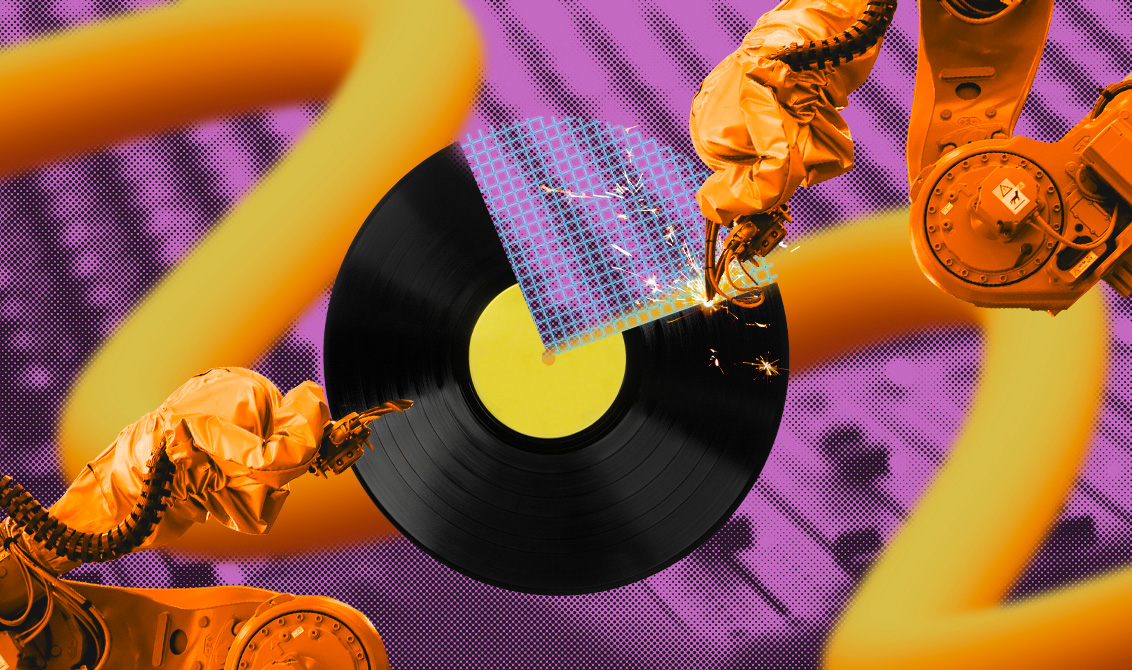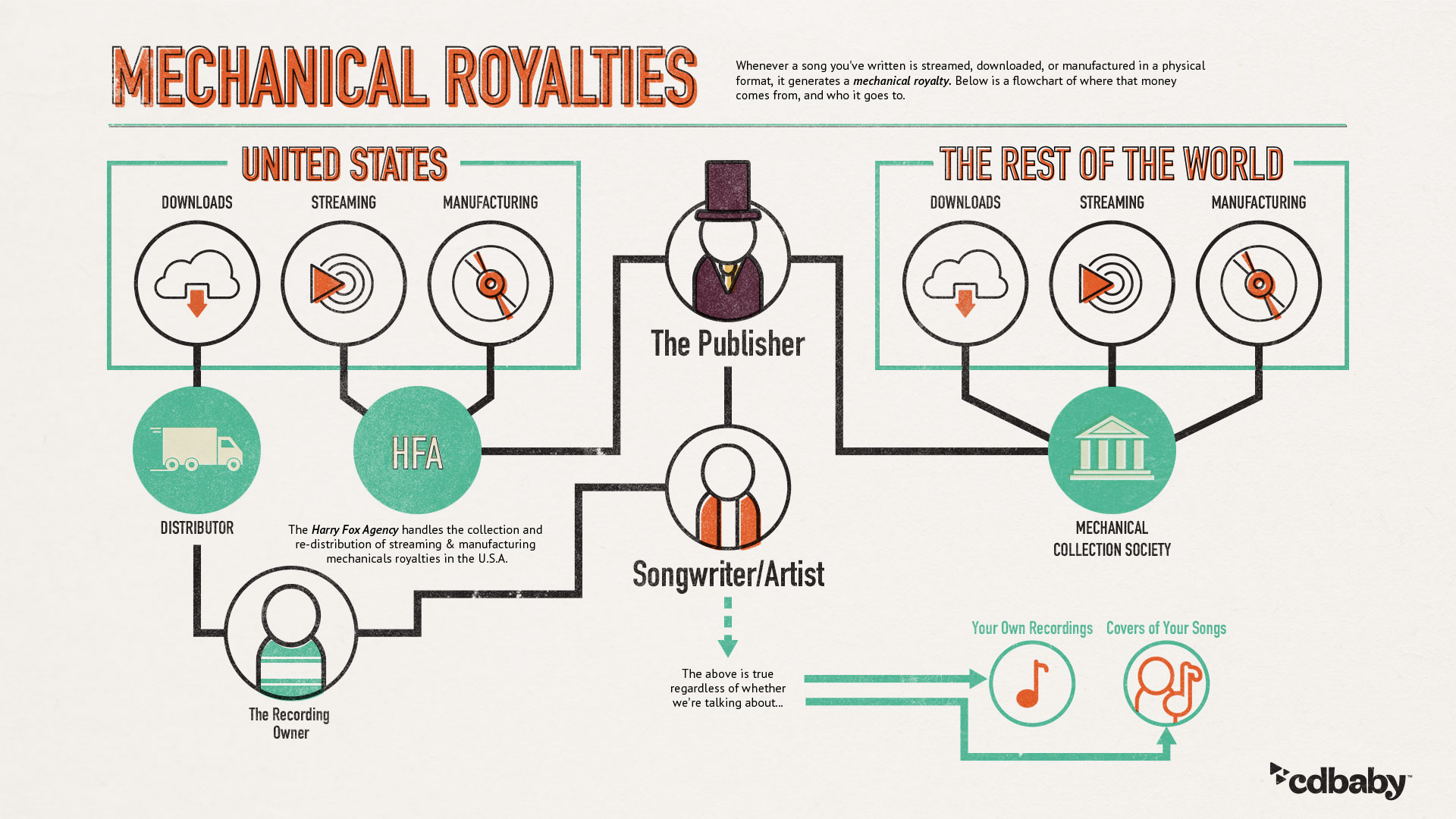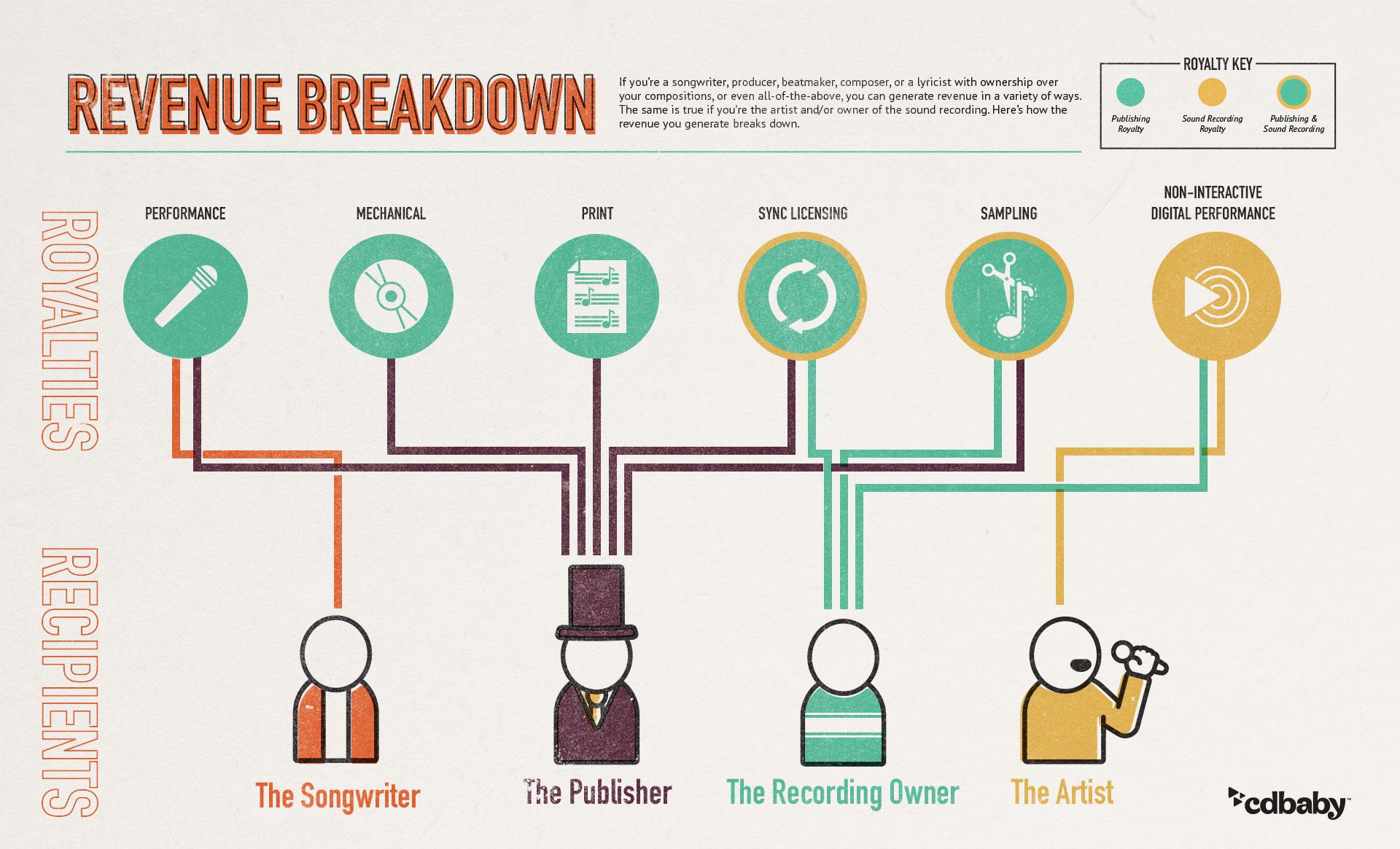
What is music publishing?
Music publishing is the exploitation of a song’s composition copyright. The composition of a song is the lyrics and melody as written by one or more songwriters. This is an important distinction to make between the two types of copyright we covered in our Copyright 101 guide: the difference between the composition copyright and the sound recording copyright.
Music publishing only relates to the composition.
What types of royalties can I earn from music publishing?
Songwriters make money from their compositions a few different ways:
- Performance royalties
- Mechanical royalties
- Sync licensing fees
- Licenses for samples
- Printing sheet music
How much money can I make from music publishing?
The amount of money you can earn from publishing depends on a few things. There’s no definitive, guaranteed number for everyone. Like sales and streaming revenue, the publishing royalties you earn are contingent on how much work you’re doing to promote your music and get it heard.
What’s certain though is that publishing accounts for a huge portion of overall music industry revenue. As an independent artist, if you write your own songs, you have a powerful tool to earn money from many sources. All of the sources detailed in the section above can bring in royalties above and beyond what you’re already collecting from downloads, streams, ticket sales, and more. Sales and streaming revenue is only earned from the sound recording, which is one of two types of copyright. So if you’re not exploiting your composition copyright by seeking publishing royalties, you’re only earning on half of the copyrights you own. Potential earnings from publishing are being left on the table!
The actual royalty amount you stand to make from interactive streaming is in constant contention in U.S. courts. The Copyright Royalty Board (CRB) is an organization that protects the rights of songwriters and publishers and works in their best interests to make sure they’re paid fairly for the use of their compositions. In early 2018, the CRB ruled to increase rates charged to the streaming platforms like Spotify and Amazon for the use of songs in their catalogs. The board aims to hike rates by as much as 44% by 2023, with each year seeing an increase in fees until that end date. Earlier this year, the platforms filed an appeal, so now it’s a waiting game while the courts sort out the contest between the CRB and the streaming services. What this means for songwriters is that should the platforms’ appeal fail, you stand to start making considerably more per stream than you do currently.
How do I collect all of my publishing royalties?
The caveat for independent artists who write and perform their own songs is that, while you control both of your copyrights, it’s extremely difficult to collect all of the royalties earned from your composition copyright by yourself. This is because collecting every publishing royalty you’re owed requires you to register your songs with hundreds of organizations around the world and have a catalog large enough to qualify as a publisher. You can certainly collect some of your publishing royalties on your own from domestic sources, but there’s a good chance you’re leaving royalties unclaimed from sources you don’t have the authority to collect from.
What are performance royalties?
Any time a song you composed is played in public – via a live performance or on the radio or through speakers at a restaurant – that “performance” generates a corresponding performance royalty. These royalties are collected by the performing rights organization (PRO)in which that performance took place.
What is a performing rights organization (PRO)?
A performing rights organization, also known as a PRO, is an agency whose job is to monitor radio airplay and live performances. They then pay royalties to the songwriters and publishers who claim ownership to the songs. PROs charge a blanket licensing fee for radio stations, venues and even restaurants for the rights to host performances of the songs in the PROs’ catalog. This fee is scaled to the size of the station or venue; the larger it is the more they pay the PRO. The PROs use that money to pay songwriters and publishers.
If you’re touring or playing a few shows locally, it’s always a good idea to register your setlist with your PRO. That’s performance revenue waiting for you, and all you need to do is enter some quick data.
How do PROs pay performance royalties?
PROs split performance royalties 50/50 between the songwriter and publisher.
Which performing rights organization (PRO) should I join?
This question comes up a lot with new songwriters, since in the U.S. we have two main PROs: ASCAP and BMI.
Both ASCAP and BMI perform the same service of collecting royalties, so there is no “better” PRO between the two. The only real difference between the two is that BMI does not charge for a songwriter affiliation while ASCAP charges $50 to affiliate as a songwriter. BMI does charge $150 to create a publisher, while ASCAP charges $50 to affiliate as a publisher. ASCAP also requires you to affiliate a publisher to collect the publisher’s share of the royalties, while BMI allows songwriters to collect the publisher’s share directly.
SESAC is the third major PRO in the U.S. They are invite-only, so you must either be invited by them to join or a member must recommend you.
What are mechanical royalties?
When your composition is recreated in a “mechanical” format, that generates a corresponding mechanical royalty. The term originated when physical media was the only way people bought music, so each reproduction of a composition on vinyl, tape or CD generated a mechanical royalty.
Since the advent of digital media, mechanical royalties have expanded to digital sales and streams. Whenever your composition is downloaded from a service like iTunes or played via an interactive streaming service like Apple Music or Spotify, you are owed a mechanical royalty.
Mechanical royalties are also generated by artists recording their own version of your composition. If someone wants to record a song you wrote, they must pay the current mechanical rate in the U.S., which is 9.1 cents per copy (what they are expecting to sell). These mechanical royalties are paid to a mechanical agency.
What is a mechanical agency?
Like a performing rights organization, a mechanical agency is an organization that collects mechanical royalties. They collect these from labels for the pressing of physical media and from digital services like iTunes/Apple Music and Spotify for downloads and interactive streams. They also collect directly from artists who pay them the mechanical rate for cover songs.
How do I join a mechanical agency?
The only mechanical agency in the U.S. is the Harry Fox Agency (HFA). Most artists know them from their licenses for cover songs, but HFA also collects mechanical royalties from digital platforms. All other countries have mechanical agencies, but most smaller countries combine them with the PRO so they are not separate entities like HFA is in the USA.
It is very difficult to join Harry Fox as an independent artist. Only publishers can affiliate with HFA, and they require that publisher to have a large catalog of songs.
How do I collect mechanical royalties?
Since only publishers can join a mechanical agency, mechanical royalties can only be paid to a publisher. CD Baby can help collect these royalties on your behalf.
This aspect of the publishing administration service is particularly beneficial to independent songwriters, not only because of the requirements to affiliate with HFA, but also because of the difficulty of collecting mechanical royalties internationally. When someone buys a download of a song you wrote in the U.S., the digital service includes the resulting mechanical royalty in with the revenue for the sound recording that they pay to the distributor (CD Baby, in this case).
Not so internationally. If someone buys a download of a song you wrote on a digital platform outside the U.S., that country’s mechanical agency collects the mechanical royalty. They hold onto that money until a publisher claims it.
What is the Mechanical Licensing Collective?
The Mechanical Licensing Collecting (or MLC) is a new U.S.-based Mechanical Rights Organization (MRO) designated by the U.S. Copyright Office to issue and administer the digital audio mechanical blanket license in accordance with the Music Modernization Act to DSPs in the United States. They are now responsible for collecting mechanical royalties from streaming platforms in the U.S. This distinction is important, because the MLC does not collect international royalties. It will only collect royalties generated from streams in the U.S.
With CDB Boost, we’ll register your music with The MLC and help you earn “mechanical royalties” whenever your original songs are streamed in the United States.
What is sync licensing?
Sync licensing is the placement of music in other media, like a TV show, movie or advertisement. The “sync” part comes from the synchronization of music to the moving images. When a song you wrote is licensed for placement in other media, you are owed sync royalties. There are two types of royalties earned for this placement:
- The upfront placement fee: This is paid by the production company for the placement of your song and is only paid once.
- The sync royalties: Whenever media that contains your song is played, it generates a performance royalty. The TV network tracks those plays and files a cue sheet to report the play to your PRO, who then pay you the royalties.
How do I collect sync licensing royalties?
CD Baby has a music library of thousands of songs ready for placement. With CDB Boost, you’ll have the opportunity to get placed, reach new listeners, and earn upfront sync fees, performance royalties, or both!
We’ve placed songs from independent artists just like you in many major TV shows and commercials. More and more music supervisors are seeking music from CD Baby because we boast a large catalog of music that can be licensed without the red tape of major label interference. Since opting in to sync licensing with CD Baby means the artist owns both copyrights (the composition and the sound recording), music supervisors have learned that licensing through us is quick and easy because they can clear all of the rights in one place.
How do I credit other songwriters?
If you wrote your composition with other songwriters, you’ll want to complete a split sheet form. This will secure in writing who wrote what percentage of each song, adding up to 100%. A split sheet is a clean, easy way of declaring who is owed what when royalties start to come in.
Should I give my producer some of the publishing?
In the modern music business, producers have an increased role in the song creation process. So if you worked with a producer who made beats or otherwise helped with your song’s creation, should you give them some of the songwriting credit? That depends.
Remember that a song is technically the words and melody and nothing else. So while producers can significantly contribute to a song’s completion by adding other elements, if they did not contribute to the words or melody they have no legal right to the composition.
But there are also many cases where a producer’s input — whether it’s a beat, a riff or a bridge — is integral to the finished product. So if your producer contributed something to the song that you feel is now a vital part of your composition, you can give them some percentage of the song split. As always, each case is subjective, so we recommend talking with your producer and documenting your agreement on paper.
How do I pay other songwriters?
When your publishing royalty reports come in, we’ll detail which songwriter is owed what amount of the revenue. It is then your responsibility as the account holder to pay those songwriters their share. Keep in mind that this is only the publisher’s share of the royalties, since the PROs will pay the songwriters’ shares directly to them.
Are there other royalties I can earn?
The music industry is an ever-evolving business. New methods of listening to music mean new avenues from which to earn revenue. For example, what about satellite and Internet radio like SiriusXM and Pandora? These are technically radio stations like regular old terrestrial AM/FM radio, but they operate differently. While the PROs pay performance royalties to songwriters and publishers for airplay on terrestrial radio, royalties from airplay on satellite and Internet radio are payable to artists and labels since that revenue is generated by the sound recording copyright.
The revenue generated from airplay on satellite and Internet radio is collected by SoundExchange, who splits royalties 50/50 between the artist and the label. Think of it as a digital performance royalty, with the performing artist(s) and label being entitled to that revenue the same way songwriters and publishers are to AM/FM radio airplay. If you’re getting rotation on satellite and Internet radio, we suggest you create an account with SoundExchange to collect those royalties. CD Baby has an agreement with them to collect any unclaimed label royalties from them, but you will need to affiliate with them as an artist and register your songs to claim the artist’s share.
Closing thoughts
Like all areas of the music industry, music publishing is changing rapidly with the modern ways people listen to music. However, its core tenet is still intact: making sure songwriters are compensated for their hard work creating music for others to enjoy. As always, CD Baby is part of this tradition and here to help our artists navigate its world.

